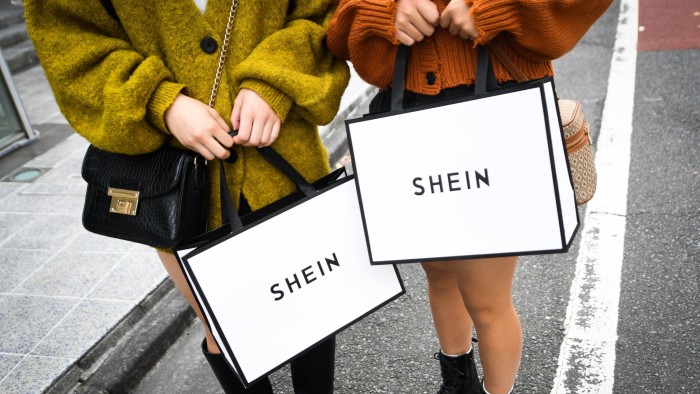London should take a chance on Shein’s fast-fashion IPO

Unlock the Editor’s Digest for free
Roula Khalaf, Editor of the FT, selects her favourite stories in this weekly newsletter.
If the fast-fashion group Shein manages to become one of the largest UK-listed public companies next year, no one can claim to be unprepared. Founded in China, headquartered in Singapore, spurned by US politicians and regulators, it will have found a financial home in Britain.
Shein has not done so yet, despite the energetic efforts of Donald Tang, its executive chair, to persuade the UK of its bona fides. The UK’s listings regime was reformed this year to attract more fast-growing, founder-led businesses and end a long drought suffered by the London Stock Exchange. This IPO is tempting, but has some perils.
Human rights campaigners are already vociferously opposed, claiming that Shein is associated with workers’ rights violations in China and with cotton from its Xinjiang region. They insist it should not be allowed to list in the UK. Political scrutiny will intensify next year when a House of Commons committee hopes to question Tang about its record.
There is plenty else to concern investors. Shein’s effort to mollify Chinese regulators by transforming into a global company without openly criticising the country where most of its clothes are made, and where most of its 16,000 employees work, could easily backfire. The risk factors section of its IPO prospectus will not lack for material.
But I cannot see sufficient reason for the Financial Conduct Authority to reject Shein’s listing, whether or not it merits the mooted £50bn valuation that would place it high in the FTSE 100 index. If Shein wants to become a UK public company, with all of the legal, media and financial scrutiny this entails, let it carry on.
There is not enough evidence to reject it in a letter sent to the FCA by the law firm representing Stop Uyghur Genocide, which has campaigned to stop minority Uyghur people being used as forced labour in Xinjiang. The letter says it would be “irrational” for the UK regulator to approve Shein’s listing, but there is no obvious breach of the rules governing financial markets.
Shein’s handling of the 5,800 contract factories where workers stitch small batches of its orders to meet the changing whims of shoppers is relevant, of course. It claims to source all its cotton from outside China, and that less than 2 per cent is traceable to Xinjiang. It also makes suppliers sign a labour code of conduct, and says it withdraws business from those that ignore it.
Its advantage over fast-fashion rivals in the UK is partly due to its low-wage network in China (it also has some factories in Brazil and Turkey). But its technology is also very efficient, enabling it to fulfil orders quickly, and to operate on demand with a minimum of inventory.
There remain reasons to be wary. The cost arbitrage on which Shein built its business could soon be squeezed. It may have to pay factories more to retain workers in China and the tax advantage it gains from sending orders direct to customers’ homes is threatened. The US is its largest market and it needs to diversify production to deal with Donald Trump’s threatened China tariffs.
Shein’s governance is also a concern. Its founder Sky Xu holds a 37 per cent stake and the company is likely to adopt a dual class share voting structure to entrench his and his co-founders’ control. Anyone joining Shein’s minority investors, including Abu Dhabi’s sovereign wealth fund Mubadala, must accept that they have limited power.
This makes it imperative that Shein has an independent-minded board, with a majority of non-executive directors offering a counterweight to Xu. The fact that it has taken so long for Shein to gain an international listing shows the constraints under which it operates. It craves the credibility that the UK and its legal system offers, but it needs to provide reassurance in return.
There are clearly risks in allowing Shein to list on the LSE. The UK market has painful memories of a past influx of global companies seen as having inadequate governance, notably the Kazakh mining group, Eurasian Natural Resources Corporation. Investors do not want to go through similar troubles again.
But this year’s reforms were designed to rekindle activity after a prolonged decline in the number of UK-listed companies and a move in IPOs to the US. The liberalisation, including the acceptance of dual-class voting, is meant to attract more entrepreneurial businesses in growth sectors to London. In many ways, Shein fits the bill.
Campaigners will protest, and some institutions will shun Shein. But on the evidence so far, there is no reason to bar it from London. Going public will raise the pressure to keep cleaning up its act. Were I a fund manager, I would examine its business and governance carefully, but I would want that chance.
#London #chance #Sheins #fastfashion #IPO




